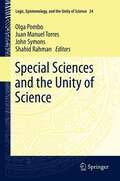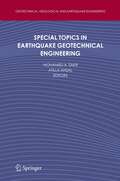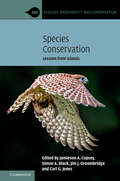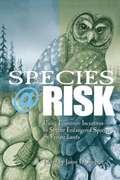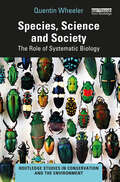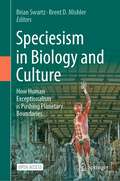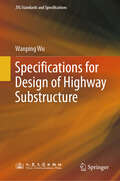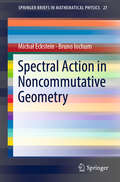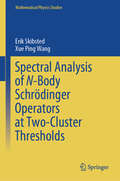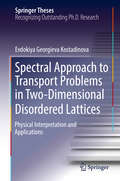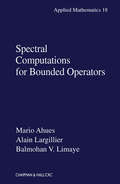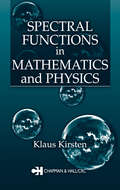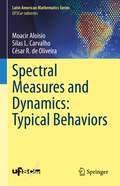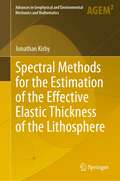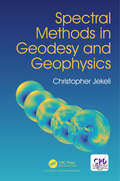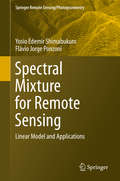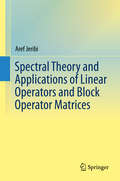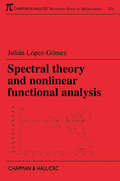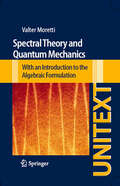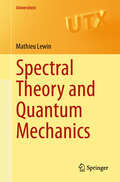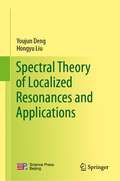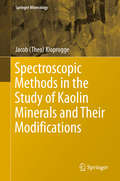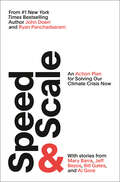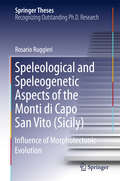- Table View
- List View
Special Sciences and the Unity of Science
by Shahid Rahman Olga Pombo John Symons Juan Manuel TorresScience is a dynamic process in which the assimilation of new phenomena, perspectives, and hypotheses into the scientific corpus takes place slowly. The apparent disunity of the sciences is the unavoidable consequence of this gradual integration process. Some thinkers label this dynamical circumstance a 'crisis'. However, a retrospective view of the practical results of the scientific enterprise and of science itself, grants us a clear view of the unity of the human knowledge seeking enterprise. This book provides many arguments, case studies and examples in favor of the unity of science. These contributions touch upon various scientific perspectives and disciplines such as: Physics, Computer Science, Biology, Neuroscience, Cognitive Psychology, and Economics.
Special Topics in Earthquake Geotechnical Engineering
by Atilla Ansal Mohamed A. SakrGeotechnical Earthquake Engineering and Soil Dynamics, as well as their interface with Engineering Seismology, Geophysics and Seismology, have all made remarkable progress over the past 15 years, mainly due to the development of instrumented large scale experimental facilities, to the increase in the quantity and quality of recorded earthquake data, to the numerous well-documented case studies from recent strong earthquakes as well as enhanced computer capabilities. One of the major factors contributing to the aforementioned progress is the increasing social need for a safe urban environment, large infrastructures and essential facilities. The main scope of our book is to provide the geotechnical engineers, geologists and seismologists, with the most recent advances and developments in the area of earthquake geotechnical engineering, seismology and soil dynamics.
Species Conservation: Lessons from Islands (Ecology, Biodiversity and Conservation)
by Jamieson A. Copsey Simon A. Black Jim J. Groombridge Carl G. JonesThis book brings together leading conservation practitioners to reflect on their response to the current global biodiversity crisis, through the lens of island species recovery and management. Initial chapters cover the biological understanding of small population biology and the growing threat of invasive species, while subsequent chapters discuss the management of these threats and the complexity of leading projects within a dynamic and still relatively unknown system. Multiple case studies from islands worldwide illustrate key points, allowing readers to draw on the first-hand practical experience of experienced professionals. This resource will be invaluable to both current and future conservation professionals, helping them to go beyond disciplinary 'comfort zones' and develop, manage and lead projects over extensive timeframes in a way that brings others with them on the journey.
Species at Risk: Using Economic Incentives to Shelter Endangered Species on Private Lands
by Jason F. ShogrenProtecting endangered species of animals and plants is a goal that almost everyone supports in principle--but in practice private landowners have often opposed the regulations of the Endangered Species Act, which, they argue, unfairly limits their right to profit from their property. <P><P>To encourage private landowners to cooperate voluntarily in species conservation and to mitigate the economic burden of doing so, the government and nonprofit land trusts have created a number of incentive programs, including conservation easements, leases, habitat banking, habitat conservation planning, safe harbors, candidate conservation agreements, and the "no surprise" policy.
Species, Science and Society: The Role of Systematic Biology (Routledge Studies in Conservation and the Environment)
by Quentin WheelerThis book presents an engaging and accessible examination of the role of systematic biology in species exploration and biodiversity conservation. Our planet and systematic biology are at a crossroads. Millions of species face an imminent threat of extinction, and, with knowledge of only a fraction of earth’s species we are unprepared to respond. Species, Science and Society explains what is at stake if we continue to ignore the traditional mission of systematics. Rejecting claims that it is too late to document earth’s species, that molecular evidence is sufficient and that comparative morphology and the grand traditions of systematics are outdated, this book makes a compelling argument for a taxonomic renaissance. The book challenges readers to rethink assumptions about systematics. Shattering myths and misconceptions and clarifying the role of systematics in confronting mass extinction, it hopes to inspire a new generation of systematists. Readers are given a deeply personal view of the mission, motivations and rewards of systematic biology. Written in narrative style with passion, wit and optimism, it is the first book to question the growing dominance of molecular data, defend descriptive taxonomy and propose a mission to discover, describe and classify all species. Our evolutionary heritage, the fate of society and the future of the planet depend on what we do next. This book will be of great interest to academics, researchers and professionals working in systematics, taxonomy and biodiversity conservation, as well as students with a basic background in biology.
Species, Science and Society: The Role of Systematic Biology (Routledge Studies in Conservation and the Environment)
by Quentin Wheeler- presents an engaging and accessible examination of the role of systematic biology in species exploration and biodiversity conservation - clarifies misconceptions about systematic biology, reimagining it for the 21st Century - proposes an ambitious, planetary-scale project to inventory and make known every kind of plant, animal, and microbe on Earth - challenges the next and present generations of taxonomists to allow molecular data to assume it’s proper place alongside traditional data, to reembrace the fundamentally important mission of systematics - will be of great interest to those researching and working in systematics in botany and zoology, as well as professionals working in taxonomy and biodiversity conservation.
Speciesism in Biology and Culture: How Human Exceptionalism is Pushing Planetary Boundaries
by Brent D. Mishler Brian SwartzThis open access book explores a wide-ranging discussion about the sociopolitical, cultural, and scientific ramifications of speciesism and world views that derive from it. In this light, it integrates subjects across the natural sciences, social sciences, and humanities. The 21st-century western world is anthropocentric to an extreme; we adopt unreasonably self-centered and self-serving ideas and lifestyles. Americans consume more energy resources per person than most other nations on Earth and have little concept of how human ecology and population biology interface with global sustainability. We draw upon religion, popular culture, politics, and technology to justify our views and actions, yet remain self-centered because our considerations rarely extend beyond our immediate interests. Stepping upward on the hierarchy from “racism,” “speciesism” likewise refers to the view that unique natural kinds (species) exist and are an important structural element of biodiversity. This ideology manifests in the cultural idea that humans are distinct from and intrinsically superior to other forms of life. It further carries a plurality of implications for how we perceive ourselves in relation to nature, how we view Judeo-Christian religions and their tenets, how we respond to scientific data about social problems such as climate change, and how willing we are to change our actions in the face of evidence.
Specifications for Design of Highway Substructure (JTG Standards and Specifications)
by Wanping WuThis book is formulated to establish uniformity for technical standards of highway substructure design and to make substructure engineering design meet the requirements of safety, reliability, technical advancements, economy, and rationality. It is applicable to the substructure design of the new construction and expansion of all classified highways. The ‘substructure’ in this book includes the whole parts of highway trapezoidal cross section. That is to say, it is generally referred to as general facilities, not only the subgrade, but also the slope protection, drainage, and retaining wall are included.
Spectral Action in Noncommutative Geometry (SpringerBriefs in Mathematical Physics #27)
by Michał Eckstein Bruno IochumWhat is spectral action, how to compute it and what are the known examples? This book offers a guided tour through the mathematical habitat of noncommutative geometry à la Connes, deliberately unveiling the answers to these questions.After a brief preface flashing the panorama of the spectral approach, a concise primer on spectral triples is given. Chapter 2 is designed to serve as a toolkit for computations. The third chapter offers an in-depth view into the subtle links between the asymptotic expansions of traces of heat operators and meromorphic extensions of the associated spectral zeta functions. Chapter 4 studies the behaviour of the spectral action under fluctuations by gauge potentials. A subjective list of open problems in the field is spelled out in the fifth Chapter. The book concludes with an appendix including some auxiliary tools from geometry and analysis, along with examples of spectral geometries.The book serves both as a compendium for researchers in the domain of noncommutative geometry and an invitation to mathematical physicists looking for new concepts.
Spectral Analysis of N-Body Schrödinger Operators at Two-Cluster Thresholds (Mathematical Physics Studies)
by Erik Skibsted Xue Ping WangThis book provides a systematic study of spectral and scattering theory for many-body Schrödinger operators at two-cluster thresholds. While the two-body problem (reduced after separation of the centre of mass motion to a one-body problem at zero energy) is a well-studied subject, the literature on many-body threshold problems is sparse. However, the authors’ analysis covers for example the system of three particles interacting by Coulomb potentials and restricted to a small energy region to the right of a fixed nonzero two-body eigenvalue. In general, the authors address the question: How do scattering quantities for the many-body atomic and molecular models behave within the limit when the total energy approaches a fixed two-cluster threshold? This includes mapping properties and singularities of the limiting scattering matrix, asymptotics of the total scattering cross section, and absence of transmission from one channel to another in the small inter-cluster kinetic energy region. The authors’ principal tools are the Feshbach–Grushin dimension reduction method and spectral analysis based on a certain Mourre estimate. Additional topics of independent interest are the limiting absorption principle, micro-local resolvent estimates, Rellich- and Sommerfeld-type theorems and asymptotics of the limiting resolvents at thresholds. The mathematical physics field under study is very rich, and there are many open problems, several of them stated explicitly in the book for the interested reader.
Spectral Approach to Transport Problems in Two-Dimensional Disordered Lattices: Physical Interpretation And Applications (Springer Theses)
by Evdokiya Georgieva KostadinovaThis book introduces the spectral approach to transport problems in infinite disordered systems characterized by Anderson-type Hamiltonians. The spectral approach determines (with probability one) the existence of extended states for nonzero disorder in infinite lattices of any dimension and geometry. Here, the author focuses on the critical 2D case, where previous numerical and experimental results have shown disagreement with theory. Not being based on scaling theory, the proposed method avoids issues related to boundary conditions and provides an alternative approach to transport problems where interaction with various types of disorder is considered.Beginning with a general overview of Anderson-type transport problems and their relevance to physical systems, it goes on to discuss in more detail the most relevant theoretical, numerical, and experimental developments in this field of research. The mathematical formulation of the innovative spectral approach is introduced together with a physical interpretation and discussion of its applicability to physical systems, followed by a numerical study of delocalization in the 2D disordered honeycomb, triangular, and square lattices. Transport in the 2D honeycomb lattice with substitutional disorder is investigated employing a spectral analysis of the quantum percolation problem. Next, the applicability of the method is extended to the classical regime, with an examination of diffusion of lattice waves in 2D disordered complex plasma crystals, along with discussion of proposed future developments in the study of complex transport problems using spectral theory.
Spectral Computations for Bounded Operators
by Mario Ahues Alain Largillier Balmohan LimayeExact eigenvalues, eigenvectors, and principal vectors of operators with infinite dimensional ranges can rarely be found. Therefore, one must approximate such operators by finite rank operators, then solve the original eigenvalue problem approximately. Serving as both an outstanding text for graduate students and as a source of current results for
Spectral Functions in Mathematics and Physics
by Klaus KirstenThe literature on the spectral analysis of second order elliptic differential operators contains a great deal of information on the spectral functions for explicitly known spectra. The same is not true, however, for situations where the spectra are not explicitly known. Over the last several years, the author and his colleagues have developed new,
Spectral Measures and Dynamics: Typical Behaviors (Latin American Mathematics Series)
by César R. de Oliveira Moacir Aloisio Silas L. CarvalhoThis book convenes and deepens generic results about spectral measures, many of them available so far in scattered literature. It starts with classic topics such as Wiener lemma, Strichartz inequality, and the basics of fractal dimensions of measures, progressing to more advanced material, some of them developed by the own authors.A fundamental concept to the mathematical theory of quantum mechanics, the spectral measure relates to the components of the quantum state concerning the energy levels of the Hamiltonian operator and, on the other hand, to the dynamics of such state. However, these correspondences are not immediate, with many nuances and subtleties discovered in recent years.A valuable example of such subtleties is found in the so-called “Wonderland theorem” first published by B. Simon in 1995. It shows that, for some metric space of self-adjoint operators, the set of operators whose spectral measures are singular continuous is a generic set (which, for some, is exotic). Recent works have revealed that, on top of singular continuity, there are other generic properties of spectral measures. These properties are usually associated with a number of different notions of generalized dimensions, upper and lower dimensions, with dynamical implications in quantum mechanics, ergodicity of dynamical systems, and evolution semigroups. All this opens ways to new and instigating avenues of research.Graduate students with a specific interest in the spectral properties of spectral measure are the primary target audience for this work, while researchers benefit from a selection of important results, many of them presented in the book format for the first time.
Spectral Methods for the Estimation of the Effective Elastic Thickness of the Lithosphere (Advances in Geophysical and Environmental Mechanics and Mathematics)
by Jonathan KirbyAlthough several excellent works exist that describe the effective elastic thickness (Te) of the lithosphere—its theory, significance and relevance to Earth sciences in general—none cover the details of the methods for its estimation. This book brings together the disparate knowledge required to estimate Te in one handy volume: signal processing, harmonic analysis, civil engineering, and foundational mathematics and physics, in addition to the relevant geophysics and, to a lesser extent, geology. Its two principal focus areas are spectral estimation, covering various approaches to estimating the admittance and coherence between gravity and topography using Slepian multitapers and fan wavelets; and algebraic and finite difference solutions of the plate bending partial differential equation in a variety of geological settings. This book would be suitable for postgraduate students beginning their research, up to faculty professors interested in diversifying their skills.
Spectral Methods in Geodesy and Geophysics
by Christopher JekeliThe text develops the principal aspects of applied Fourier analysis and methodology with the main goal to inculcate a different way of perceiving global and regional geodetic and geophysical data, namely from the perspective of the frequency, or spectral, domain rather than the spatial domain. The word "methods" in the title is meant to convey that the transformation of a geophysical signal into the spectral domain can be applied for purposes of analysis as well as rapid computation. The text is written for graduate students; however, Chapters 1 through 4 and parts of 5 can also benefit undergraduates who have a solid and fluent knowledge of integral and differential calculus, have some statistical background, and are not uncomfortable with complex numbers. Concepts are developed by starting from the one-dimensional domain and working up to the spherical domain, which is part of every chapter. Many concepts are illustrated graphically with actual geophysical data primarily from signals of gravity, magnetism, and topography.
Spectral Mixture for Remote Sensing: Linear Model and Applications (Springer Remote Sensing/Photogrammetry)
by Yosio Edemir Shimabukuro Flávio Jorge PonzoniThis book explains in a didactic way the basic concepts of spectral mixing, digital numbers and orbital sensors, and then presents the linear modelling technique of spectral mixing and the generation of fractional images. In addition to presenting a theoretical basis for spectral mixing, the book provides examples of practical applications such as projects for estimating and monitoring deforested areas in the Amazon. In its seven chapters, the book offers remote sensing techniques to understand the main concepts, methods, and limitations of spectral mixing for digital image processing. Chapter 1 addresses the basic concepts of spectral mixing, while chapters 2 and 3 discuss digital numbers and orbital sensors such as MODIS and Landsat MSS. Chapter 4 details the linear spectral mixing model, and chapter 5 talks about how to use this technique to create fraction images. Chapter 6 offers remote sensing applications of fraction images in deforestation monitoring, burned-area mapping, selective logging detection, and land-use/land-cover mapping. Chapter 7 gives some concluding thoughts on spectral mixing, and considers future uses in environmental remote sensing. This book will be of interest to students, teachers, and researchers using remote sensing for Earth observation and environmental modelling.
Spectral Theory and Applications of Linear Operators and Block Operator Matrices
by Aref JeribiExamining recent mathematical developments in the study of Fredholm operators, spectral theory and block operator matrices, with a rigorous treatment of classical Riesz theory of polynomially-compact operators, this volume covers both abstract and applied developments in the study of spectral theory. These topics are intimately related to the stability of underlying physical systems and play a crucial role in many branches of mathematics as well as numerous interdisciplinary applications. By studying classical Riesz theory of polynomially compact operators in order to establish the existence results of the second kind operator equations, this volume will assist the reader working to describe the spectrum, multiplicities and localization of the eigenvalues of polynomially-compact operators.
Spectral Theory and Nonlinear Functional Analysis (Chapman & Hall/CRC Research Notes in Mathematics Series)
by Julian Lopez-GomezThis Research Note addresses several pivotal problems in spectral theory and nonlinear functional analysis in connection with the analysis of the structure set of zeroes of a general class of nonlinear operators. Appealing to a broad audience, it contains many important contributions to linear algebra, linear functional analysis, nonlinear functional analysis, and topology. The author gives several applications of the abstract theory to reaction diffusion equations and systems. The results presented cover a thirty-year period and cut across a variety of mathematical fields.
Spectral Theory and Quantum Mechanics
by Valter MorettiThis book pursues the accurate study of the mathematical foundations of Quantum Theories. It may be considered an introductory text on linear functional analysis with a focus on Hilbert spaces. Specific attention is given to spectral theory features that are relevant in physics. Having left the physical phenomenology in the background, it is the formal and logical aspects of the theory that are privileged. Another not lesser purpose is to collect in one place a number of useful rigorous statements on the mathematical structure of Quantum Mechanics, including some elementary, yet fundamental, results on the Algebraic Formulation of Quantum Theories. In the attempt to reach out to Master's or PhD students, both in physics and mathematics, the material is designed to be self-contained: it includes a summary of point-set topology and abstract measure theory, together with an appendix on differential geometry. The book should benefit established researchers to organise and present the profusion of advanced material disseminated in the literature. Most chapters are accompanied by exercises, many of which are solved explicitly.
Spectral Theory and Quantum Mechanics (Universitext)
by Mathieu LewinThis textbook presents the spectral theory of self-adjoint operators on Hilbert space and its applications in quantum mechanics. Based on a course taught by the author in Paris, the book not only covers the mathematical theory but also provides its physical interpretation, offering an accessible introduction to quantum mechanics for students with a background in mathematics. The presentation incorporates numerous physical examples to illustrate the abstract theory. The final two chapters present recent findings on Schrödinger’s equation for systems of particles. While primarily designed for graduate courses, the book can also serve as a valuable introduction to the subject for more advanced readers. It requires no prior knowledge of physics, assuming only a graduate-level understanding of mathematical analysis from the reader.
Spectral Theory of Localized Resonances and Applications
by Hongyu Liu Youjun DengThis book is devoted to the spectral theory of localized resonances including surface plasmon/polariton resonances, atypical resonances, anomalous localized resonances and interior transmission resonances. Those resonance phenomena arise in different physical contexts, but share similar features. They form the fundamental basis for many cutting-edge technologies and applications including invisibility cloaking and super-resolution imaging. The book presents a systematic and comprehensive treatment on these resonance phenomena and the associated applications in a unified manner from a mathematical and spectral perspective, covering acoustic, electromagnetic and elastic wave scattering.The book can serve as a handy reference book for researchers in this field and it can also serve as a textbook or an inspiring source for postgraduate students who are interested in entering this field.
Spectroscopic Methods in the Study of Kaolin Minerals and Their Modifications (Springer Mineralogy Ser.)
by Jacob Theo KloproggeThis book systematically provides an overview of the use of a wide range of spectroscopic methods (Mid- and Near-Infrared, Infrared Emission, Raman, Solid-State Magic Angle Spinning Nuclear Magnetic Resonance, X-ray Photoelectron, Extended X-ray Absorption Fine Structure, X-ray Absorption Near Edge, Electron Spin and Mössbauer spectroscopy) to investigate kaolin minerals (kaolinite, dickite, nacrite and halloysite) and their modifications (intercalation compounds, nanocomposites and other modifications).
Speed & Scale: An Action Plan for Solving Our Climate Crisis Now
by John Doerr#1 bestselling author and acclaimed venture capitalist John Doerr reveals a sweeping action plan to conquer humanity&’s greatest challenge: climate change.In 2006, John Doerr was moved by Al Gore&’s An Inconvenient Truth and a challenge from his teenage daughter: &“Dad, your generation created this problem. You better fix it.&” Since then, Doerr has searched for solutions to this existential problem—as an investor, an advocate, and a philanthropist. Fifteen years later, despite breakthroughs in batteries, electric vehicles, plant-based proteins, and solar and wind power, global warming continues to get worse. Its impact is all around us: droughts, floods, wildfires, the melting of the polar ice caps. Our world is squarely in a climate crisis and on the brink of a climate disaster. Yet despite our state of emergency, climate change has yet to be tackled with the urgency and ambition it demands. More than ever, we need a clear course of action. What if the goal-setting techniques that powered the rise of today's most innovative organizations were brought to bear on humanity's greatest challenge? Fueled by a powerful tool called Objectives and Key Results (OKRs), SPEED & SCALE offers an unprecedented global plan to cut greenhouse gas emissions before it&’s too late. Used by Google, Bono&’s ONE foundation, and thousands of startups the world over, OKRs have scaled ideas into achievements that changed the world. With clear-eyed realism and an engineer&’s precision, Doerr identifies the measurable OKRs we need to reduce emissions across the board and to arrive by 2050 at net zero—the point where we are no longer adding to the heat-trapping carbon in the atmosphere. By turns pragmatic and inspiring, SPEED & SCALE intersperses Doerr&’s wide-ranging analysis with firsthand accounts from Jeff Bezos, Christiana Figueres, Al Gore, Mary Barra, Bill Gates, and other intrepid policy leaders, entrepreneurs, scientists, and activists. A launchpad for those who are ready to act now, this book is geared to leaders in every walk of life. With a definitive action plan, the latest science, and a rising climate movement on our side, we can still reach net zero before it is too late. But as Doerr reminds us, there is no more time to waste.
Speleological and Speleogenetic Aspects of the Monti di Capo San Vito (Sicily)
by Rosario RuggieriThis thesis includes a wealth of cave maps, as well as photos of the caves and karst morphologies. At the heart of the thesis is the important discovery of a flank margin cave with speleothem hiatuses and fossil invertebrate associations. The analysis of the structural and karst morphological elements surveyed in the main explored caves in Monti di Capo San Vito has made it possible to identify both the state of control of the processes of karstification in tectonic phases during the Plio-Pleistocene upliftings and the kinematic character of some karstified structures, linked at two speleogenetic phases. Furthermore, the surveying of karst forms on the relict sea-cliffs and particularly the exceptional discovery and dating of marine and continental incrustations in the Rumena cave, has yielded essential advances in our knowledge of past climatic events and eustatic level changes in the Mediterranean, as well as their influence on the evolution of the coastal belt.
